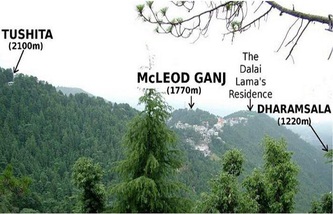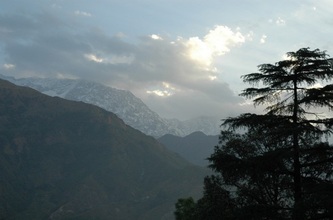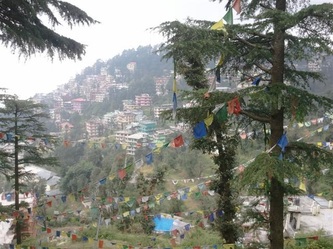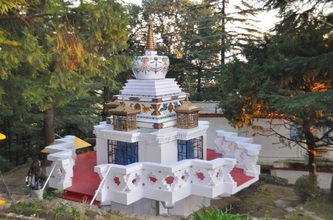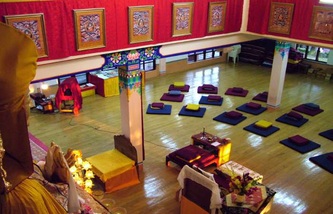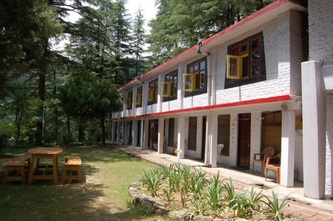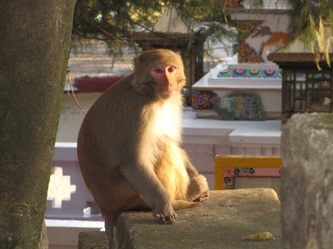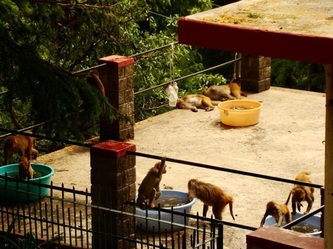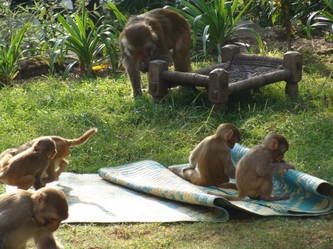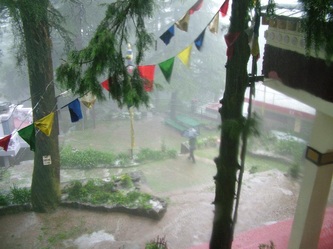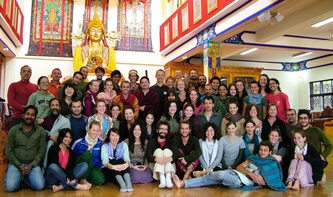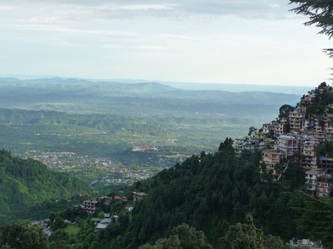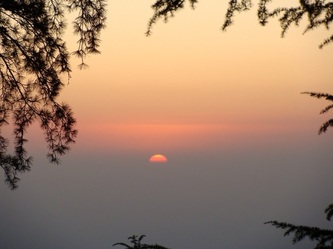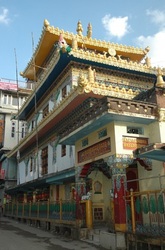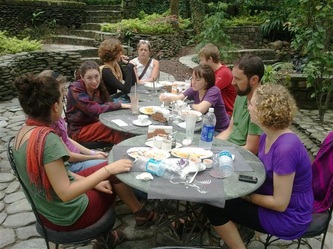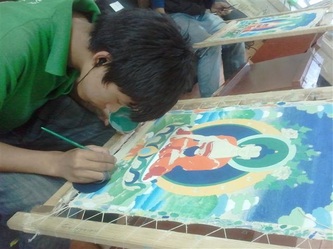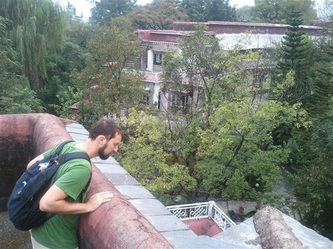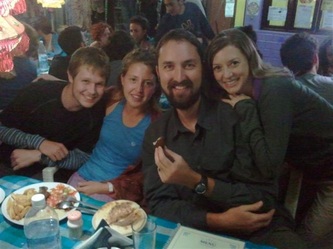We took an autorickshaw up to Tushita Meditation Centre from McLeod Ganj’s main square, since we would have had to carry our enormously heavy backpacks (despite leaving a bunch of crap at Janis’ house) up a steep mountain path. We opted to save our backs for the punishment of sitting in meditation. When we got up there, we turned in our money and wallets, books, and all electronic devices (basically anything that might tempt us with distraction). This was all locked away in a big metal safe for the duration of the camp. We mingled with the crowd a little bit and had some tea while everyone was getting registered, and Rob got put in the dorm with all the self-confessed snorers.
After settling into our rooms, we went down to the main “gompa” (meditation hall) and met our caretakers for the course. We had a German nun coordinating the course, an Australian instructor giving the teachings, and a monk from California leading the guided meditations. Quite the global perspective. After going through the rules and schedule for the duration of the camp, we got out and were allowed to go down the street for one last bit of contact with the outside world at a chai shop. Basically, the German nun wanted to make sure everyone was fully stocked with chocolates and biscuits. After that, it was no talking and no leaving the premises. And no killing anything, including spiders and mosquitoes. And no killing the monkeys. But we’ll get to that later.
We awoke each day to someone ringing a small gong at 6 AM, which is a surprisingly gentle way to wake up. Although there was one Western toilet in the shower and toilet complex near Rob’s dorm room, he caved and finally learned to use the Indian style toilet out of fear of spiders or other little beasties living on the underside of the Western toilet. He never did give the “hand-wash-the-bottom” thing a try, so he ended up carrying toilet paper with him. After brushing teeth and having a cup of tea, or in Rob's case, instant coffee (they didn’t provide any coffee, so Rob was thankful that he bought a jar of decent instant coffee in Gurgaon at Easy Day/Wal-Mart), everyone followed the gong to the gompa at 6:45 for guided meditation. We did this for 45 minutes, then broke for breakfast. Rob pulled breakfast dishwashing for Karma Yoga duty (Karma Yoga can be thought of as either selfless duty for others or as a euphemism for chores), so he had to finish breakfast a little faster and throw on an apron to join 4 teammates and slog through plates, bowls, mugs, and silverware for the 66 students in our class. They didn’t quite finish their task on the first day, but they got the hang of it by day 2 and finished within about 45 minutes. After that, we had two sessions of classroom instruction in the gompa, then some light stretching/yoga followed by lunch, an hour or so to relax and read, and then Karma Yoga time (sweeping, toilet cleaning, window cleaning, etc.). Amy pulled toilet cleaning duty, which sounds like a bum deal, but she was somewhat thankful in that she could ensure that the showers and toilets were clean for her own use, especially after using the dirty bathrooms at Yoga Camp in Mumbai. It was also probably one of the quickest Karma Yoga jobs because Amy was on a team of 4 to clean 3 toilets, 3 showers, and a trough (aka - sink). Indian toilets are very easy to clean because you basically just douse the whole stall in Clorox. The worst job was emptying the toilet paper bins (no TP can go down the toilets due to ancient plumbing lines getting clogged). Gross on that account. By the end, Amy's team was enjoying their little afternoon meeting and were actually a little sad when it was over. It was kind of strange, because at the end of it all, everyone thought their own Karma Yoga duty was the best assignment, and they felt really bad for somebody else (typically the dishwashers or the toilet cleaners). But the toilet cleaners finished their job within about 20 minutes, and the dishwashers got to relax during regular Karma Yoga time because they had to do their duty around mealtimes. So it all worked out pretty good.
In the afternoons, we had an hour of discussion in small groups. This was our one period of time in which we could talk (other than asking a question during lectures), so of course everyone kept talking way past the time that the gong rang to signal our end of discussion period. It was hard to cut off the interesting conversation with our new friends. Amy and Rob were in different discussion groups, so we actually didn’t talk to each other (except the very occasional quick whisper) for the whole ten days. The discussion groups were great, though, because that’s where we got to understand what other people were bringing to the table when they looked at Buddhism. Some people had terrible tempers and wanted to find a way to calm down, others were simply curious about this unique approach to life, and a few of us had learned about Buddhism before, but had completely incoherent and misguided ideas about it. After discussion group, we had tea time, and then a lecture period followed by a guided meditation. After that was dinner, another guided meditation, and then around 8:30 we were free for the rest of the night to do self-study. With all the free time to sit and think and wander around the lawns, we ended up borrowing and reading several books from the on-site library over the length of the course.
One strange aspect of this whole thing was the fact that there were 66 of us, all sitting together and eating together and working alongside each other, but no talking outside of our small discussion groups. The first few days, everyone kind of awkwardly smiled and waved as we passed each other. Nobody was quite sure what the social etiquette was, when there was no talking allowed. Do you smile and nod a “hello”? Give a little hand wave? Do you look at the ground and just kind of ignore everyone? Or is it something in between? Rob took advantage of the awkwardness and gave little waves to Amy throughout the day, trying to get her to crack up and smile. But after a while, we both realized that the point was not to simply stop talking, but to stop looking outward at all, and to focus on our own internal experiences. After a few days, most people were comfortable with walking in silence and not trying to communicate using hand signals. Yet somehow, by the end we all felt like we knew each other because of our shared experience. It was a very unique bond.
Another strange part of the experience was realizing how many Israelis were in our class. As it turns out, there is a very large number of Israeli men and women who finish up their obligated tour of duty in the military (2 years for women, 3 years for men) and then go on an extended international trip before taking the next step in their professional lives. There seems to be a well-known travel circuit in North India that is very popular with these young Israelis, and nearly every one of them that we talked to had either been to these cities or was planning to go: Rishikesh, Dharamsala (specifically, two suburbs named McLeod Ganj and Bhagsu), Varanasi, and Amritsar. One thing we found quite funny were these fiery-tempered young Israelis in our class who obviously had no idea what they were signing up for, and had simply shown up at Tushita because they had heard it was cool and it was on the travel circuit. There were several crisis moments when we thought some of them were going to drop out of the class because they were disagreeing so vehemently with the instructor, but they eventually worked out whatever was bothering them and had become big fans by the last day of the course.
So, on to the monkeys. There were about 15-20 rhesus monkeys that hung around Tushita, watching for people to make mistakes and leave food unguarded. They had a combination of methods to relieve people of their food, with their two favorites being the storming of a group of people and simply snatching their biscuits and crackers out of their hands, and also teaming up to push open unlocked kitchen and dormitory room doors. When they got into unlocked rooms, they would just rip apart everything looking for food. And cigarettes. Oh, yes. They watched people doing everything, so they learned how to open bags of chips and cookies, and they also learned how to work lighters and cigarettes. It’s not just in the movie “The Hangover 2” -- one smoker told us that they had seen a monkey smoking a stolen cigarette in the trees. Clever little bastards. But Amy got a pretty good scare one day when she was walking up to her dorm room in between lecture periods and found herself right in the middle of the entire extended monkey family playing out on the lawn. Mommas were keeping watch, little baby monkeys were swinging from the Tibetan prayer flags, and the older males (which sat about three feet tall) sauntered around on the grass, scratching their bellies. When Amy stepped out onto the lawn from behind a corner of the dorm building, there were several other people, and we all just kind of stopped and looked at each other for a few seconds. We didn't know what to do. Some of the males started acting very territorial by grunting and snarling at Amy and the others. We remembered the "animals at Tushita" lecture on the first day of camp where they said "don't make eye contact" and "don't show your teeth!" Everything seemed to be okay, although Amy's heart was freaking out and trying to leap out of her chest. But then another girl came walking up the stone stairs to the lawn, staring at the ground in front of her. When she looked up, she got freaked out by all the monkeys surrounding her, and took off sprinting around the corner that Amy had just come from behind. Two of the bigger males started lumbering after her, and the only thing Amy could think to do was to try to be as unassuming as possible and look away. One of the males stopped right behind Amy and grabbed her pant leg, then gave it a couple of quick, strong yanks as if to tell her to turn around. She stood there quivering with her eyes closed, hoping that the monkey wouldn’t decide to climb up onto her. All the other monkeys quickly ran off the lawn, up onto the roof or into some trees nearby. After a few more terrifying moments, Amy peeked behind her and found the male monkey had gone. For the next week, she didn’t think that monkeys were quite as cute anymore.
As far as the content of the course, we’ll just say that we were both blown away. Rob was initially a little disappointed when we signed up for the course, since our instructor was listed as “Glenn” (he was hoping for a Tibetan name), but it turned out that Glenn was quite the rock star when it came to explaining Buddhist philosophy in a way that Westerners could understand it. Tushita is actually a branch campus of a Tibetan Buddhism monastery in Kathmandu, Nepal, so now we are trying to figure out a way to make a trip to Nepal to take their month-long course. Those ten days at Tushita were the most transformative part of our trip to India. One practical thing we took away from the course was the idea that wisdom and compassion must always go together. We had been struggling with the problem of how to emotionally deal with all the poverty we saw in India, and we felt like we were failing at being compassionate people by not giving money to every beggar we saw in the streets. But the thing to remember is that compassion without wisdom often leads to disaster for you, and wisdom without compassion is often disastrous for other people. That idea somehow made it easier for us to deal with the beggar question. It’s not so much that you set up a rule to always do one thing or the other, but that you always engage both your highest wisdom and your deepest compassion to decide what to do. Or what not to do. The course challenged our view of reality, the way we think the world works, and the ways to approach the ups and downs we face in life. It will continue to be a work in progress, but we both feel like a part of us has evolved and we now have more tools to help us make our lives as enjoyable and meaningful as possible.
After settling into our rooms, we went down to the main “gompa” (meditation hall) and met our caretakers for the course. We had a German nun coordinating the course, an Australian instructor giving the teachings, and a monk from California leading the guided meditations. Quite the global perspective. After going through the rules and schedule for the duration of the camp, we got out and were allowed to go down the street for one last bit of contact with the outside world at a chai shop. Basically, the German nun wanted to make sure everyone was fully stocked with chocolates and biscuits. After that, it was no talking and no leaving the premises. And no killing anything, including spiders and mosquitoes. And no killing the monkeys. But we’ll get to that later.
We awoke each day to someone ringing a small gong at 6 AM, which is a surprisingly gentle way to wake up. Although there was one Western toilet in the shower and toilet complex near Rob’s dorm room, he caved and finally learned to use the Indian style toilet out of fear of spiders or other little beasties living on the underside of the Western toilet. He never did give the “hand-wash-the-bottom” thing a try, so he ended up carrying toilet paper with him. After brushing teeth and having a cup of tea, or in Rob's case, instant coffee (they didn’t provide any coffee, so Rob was thankful that he bought a jar of decent instant coffee in Gurgaon at Easy Day/Wal-Mart), everyone followed the gong to the gompa at 6:45 for guided meditation. We did this for 45 minutes, then broke for breakfast. Rob pulled breakfast dishwashing for Karma Yoga duty (Karma Yoga can be thought of as either selfless duty for others or as a euphemism for chores), so he had to finish breakfast a little faster and throw on an apron to join 4 teammates and slog through plates, bowls, mugs, and silverware for the 66 students in our class. They didn’t quite finish their task on the first day, but they got the hang of it by day 2 and finished within about 45 minutes. After that, we had two sessions of classroom instruction in the gompa, then some light stretching/yoga followed by lunch, an hour or so to relax and read, and then Karma Yoga time (sweeping, toilet cleaning, window cleaning, etc.). Amy pulled toilet cleaning duty, which sounds like a bum deal, but she was somewhat thankful in that she could ensure that the showers and toilets were clean for her own use, especially after using the dirty bathrooms at Yoga Camp in Mumbai. It was also probably one of the quickest Karma Yoga jobs because Amy was on a team of 4 to clean 3 toilets, 3 showers, and a trough (aka - sink). Indian toilets are very easy to clean because you basically just douse the whole stall in Clorox. The worst job was emptying the toilet paper bins (no TP can go down the toilets due to ancient plumbing lines getting clogged). Gross on that account. By the end, Amy's team was enjoying their little afternoon meeting and were actually a little sad when it was over. It was kind of strange, because at the end of it all, everyone thought their own Karma Yoga duty was the best assignment, and they felt really bad for somebody else (typically the dishwashers or the toilet cleaners). But the toilet cleaners finished their job within about 20 minutes, and the dishwashers got to relax during regular Karma Yoga time because they had to do their duty around mealtimes. So it all worked out pretty good.
In the afternoons, we had an hour of discussion in small groups. This was our one period of time in which we could talk (other than asking a question during lectures), so of course everyone kept talking way past the time that the gong rang to signal our end of discussion period. It was hard to cut off the interesting conversation with our new friends. Amy and Rob were in different discussion groups, so we actually didn’t talk to each other (except the very occasional quick whisper) for the whole ten days. The discussion groups were great, though, because that’s where we got to understand what other people were bringing to the table when they looked at Buddhism. Some people had terrible tempers and wanted to find a way to calm down, others were simply curious about this unique approach to life, and a few of us had learned about Buddhism before, but had completely incoherent and misguided ideas about it. After discussion group, we had tea time, and then a lecture period followed by a guided meditation. After that was dinner, another guided meditation, and then around 8:30 we were free for the rest of the night to do self-study. With all the free time to sit and think and wander around the lawns, we ended up borrowing and reading several books from the on-site library over the length of the course.
One strange aspect of this whole thing was the fact that there were 66 of us, all sitting together and eating together and working alongside each other, but no talking outside of our small discussion groups. The first few days, everyone kind of awkwardly smiled and waved as we passed each other. Nobody was quite sure what the social etiquette was, when there was no talking allowed. Do you smile and nod a “hello”? Give a little hand wave? Do you look at the ground and just kind of ignore everyone? Or is it something in between? Rob took advantage of the awkwardness and gave little waves to Amy throughout the day, trying to get her to crack up and smile. But after a while, we both realized that the point was not to simply stop talking, but to stop looking outward at all, and to focus on our own internal experiences. After a few days, most people were comfortable with walking in silence and not trying to communicate using hand signals. Yet somehow, by the end we all felt like we knew each other because of our shared experience. It was a very unique bond.
Another strange part of the experience was realizing how many Israelis were in our class. As it turns out, there is a very large number of Israeli men and women who finish up their obligated tour of duty in the military (2 years for women, 3 years for men) and then go on an extended international trip before taking the next step in their professional lives. There seems to be a well-known travel circuit in North India that is very popular with these young Israelis, and nearly every one of them that we talked to had either been to these cities or was planning to go: Rishikesh, Dharamsala (specifically, two suburbs named McLeod Ganj and Bhagsu), Varanasi, and Amritsar. One thing we found quite funny were these fiery-tempered young Israelis in our class who obviously had no idea what they were signing up for, and had simply shown up at Tushita because they had heard it was cool and it was on the travel circuit. There were several crisis moments when we thought some of them were going to drop out of the class because they were disagreeing so vehemently with the instructor, but they eventually worked out whatever was bothering them and had become big fans by the last day of the course.
So, on to the monkeys. There were about 15-20 rhesus monkeys that hung around Tushita, watching for people to make mistakes and leave food unguarded. They had a combination of methods to relieve people of their food, with their two favorites being the storming of a group of people and simply snatching their biscuits and crackers out of their hands, and also teaming up to push open unlocked kitchen and dormitory room doors. When they got into unlocked rooms, they would just rip apart everything looking for food. And cigarettes. Oh, yes. They watched people doing everything, so they learned how to open bags of chips and cookies, and they also learned how to work lighters and cigarettes. It’s not just in the movie “The Hangover 2” -- one smoker told us that they had seen a monkey smoking a stolen cigarette in the trees. Clever little bastards. But Amy got a pretty good scare one day when she was walking up to her dorm room in between lecture periods and found herself right in the middle of the entire extended monkey family playing out on the lawn. Mommas were keeping watch, little baby monkeys were swinging from the Tibetan prayer flags, and the older males (which sat about three feet tall) sauntered around on the grass, scratching their bellies. When Amy stepped out onto the lawn from behind a corner of the dorm building, there were several other people, and we all just kind of stopped and looked at each other for a few seconds. We didn't know what to do. Some of the males started acting very territorial by grunting and snarling at Amy and the others. We remembered the "animals at Tushita" lecture on the first day of camp where they said "don't make eye contact" and "don't show your teeth!" Everything seemed to be okay, although Amy's heart was freaking out and trying to leap out of her chest. But then another girl came walking up the stone stairs to the lawn, staring at the ground in front of her. When she looked up, she got freaked out by all the monkeys surrounding her, and took off sprinting around the corner that Amy had just come from behind. Two of the bigger males started lumbering after her, and the only thing Amy could think to do was to try to be as unassuming as possible and look away. One of the males stopped right behind Amy and grabbed her pant leg, then gave it a couple of quick, strong yanks as if to tell her to turn around. She stood there quivering with her eyes closed, hoping that the monkey wouldn’t decide to climb up onto her. All the other monkeys quickly ran off the lawn, up onto the roof or into some trees nearby. After a few more terrifying moments, Amy peeked behind her and found the male monkey had gone. For the next week, she didn’t think that monkeys were quite as cute anymore.
As far as the content of the course, we’ll just say that we were both blown away. Rob was initially a little disappointed when we signed up for the course, since our instructor was listed as “Glenn” (he was hoping for a Tibetan name), but it turned out that Glenn was quite the rock star when it came to explaining Buddhist philosophy in a way that Westerners could understand it. Tushita is actually a branch campus of a Tibetan Buddhism monastery in Kathmandu, Nepal, so now we are trying to figure out a way to make a trip to Nepal to take their month-long course. Those ten days at Tushita were the most transformative part of our trip to India. One practical thing we took away from the course was the idea that wisdom and compassion must always go together. We had been struggling with the problem of how to emotionally deal with all the poverty we saw in India, and we felt like we were failing at being compassionate people by not giving money to every beggar we saw in the streets. But the thing to remember is that compassion without wisdom often leads to disaster for you, and wisdom without compassion is often disastrous for other people. That idea somehow made it easier for us to deal with the beggar question. It’s not so much that you set up a rule to always do one thing or the other, but that you always engage both your highest wisdom and your deepest compassion to decide what to do. Or what not to do. The course challenged our view of reality, the way we think the world works, and the ways to approach the ups and downs we face in life. It will continue to be a work in progress, but we both feel like a part of us has evolved and we now have more tools to help us make our lives as enjoyable and meaningful as possible.
